Swipe, Shop, Repeat: How Dating Apps Run on Dopamine, Not Devotion
We flatter ourselves that we are seeking love, or at least companionship, when we thumb our way through Tinder, Hinge, or whatever g
If you believe in the importance of free speech, subscribe to support uncensored, fearless writing—the more people who pay, the more time I can devote to this.
Please subscribe to receive at least three pieces /essays per week with open comments. It’s $6 per month, less than USD 4. And now take 50% off.
Everyone says, "Hey, it’s just a cup of coffee," but please choose my coffee when you come to the Substack counter. Cheers.
Three in ten Americans now shop for sex and love the way they scroll for blenders on Amazon — and one in ten couples will swear the algorithm was Cupid.
That lone bright number is paraded by the dating-app cartels like a trophy marlin, masking the dead reef beneath. The rest is a ledger of boredom, deceit, and emotional malnutrition: more than half of female users loathe the experience, three-quarters of would-be daters admit their romantic life is a shambles, and the most digitally marinated generation in history is also the loneliest.
We flatter ourselves that we are seeking love, or at least companionship, when we thumb our way through Tinder, Hinge, or whatever glossy meat-market happens to be fashionable this week. But in truth, the enterprise is less about finding a partner than about feeding a slot machine that pays out in jolts of dopamine.
The endless carousel of faces, each reduced to a swipe-right commodity, has less in common with romance than with shopping for shoes while half-drunk. And like all addictions, it offers not fulfilment but the perpetual itch for the next hit.
Apps have not democratised romance; they have turned it into a casino where the house always wins, a lottery where 90 percent chase the unattainable 10, and a marketplace where humans are reduced to inventory — curated, airbrushed, and lied about with the same brazenness as an estate agent’s brochure.
What we have built is not a revolution in courtship, but a swap-meet for avatars, in which hunting has replaced farming, and deceit is mandatory. The messy vitality of real-life love has been salted over by the algorithms that pretend to fertilise it.
The most digitally saturated generation in human history — Gen Z — is also the loneliest, while Baby Boomers, who still dare to meet people in the archaic ritual of “real life,” maintain stronger social networks.
Digitising romance expands your “market” in the same way a casino expands your options for losing money. The odds are dreadful, the game is rigged, and the house always wins.
The phrase “virtual relationship” is an oxymoron.
Real relationships are corporeal affairs. Yet we now introduce ourselves in conditions optimised for browsing, not bonding: a digital meat market helmed by algorithms guessing what your libido fancies this week. Far from fertilising the soil of romance, these apps salt it, offering the mirage of fertile ground that evaporates on contact.
Hunters and Farmers
Courtship isn’t fungible — hunting and farming are elemental opposites. Farming requires patient cultivation; hunting demands instant gratification. Dating apps manufacture hunters: predators in search of the next match, the next hit, the next ego boost — never staying long enough to nurture something genuine.
Research shows fewer people want what they claim to want: six in ten young men are single, and since 2019, the proportion of Americans even seeking a relationship has plunged — from 61% to 50% among single men, and from 38% to 35% among women. When asked about their dominant emotion related to dating apps, a resounding two-to-one verdict of “Frustration” over “Hopeful.”
Shopping for People
The dating-app business is a racket — where romance meets the cold calculus of consumerism, and what passes for courtship is little more than scrolling through a digital bazaar of airbrushed illusions. You know the drill: swipe left on the fellow with the bad haircut, right on the lass who looks like she stepped out of a shampoo advert.
It’s shopping, pure and simple, but with hearts instead of price tags. And therein lies the rot. We don’t connect in shopping, do we? No, shopping is a solitary vice — a fleeting thrill of acquisition that leaves you with a closet full of regrets and a credit card bill that mocks your loneliness.
Real human connections are messy, magnificent symphonies of shared vulnerability — the spark in a glance across a crowded pub, the subtle tilt of a head during a whispered joke, the electric brush of fingers that says more than a thousand emojis ever could.
The digital mindset isn’t openness; it’s option paralysis—an endless parade of profiles peddling perfection like clearance items at a going-out-of-business sale. Why bother unravelling the marvels of conversation—the halting pauses, the sly smiles, the body language that betrays a soul—when you can judge someone by six selfies and a bio as deep as a puddle in a drought?
And the bios. Ah, the bios. “Not looking for a hookup,” declare the women, which—judging by the emojis—is precisely what half the men are claiming not to want either. Wink. Thanks also to the legion whose “interests” are travel and going out for dinner, narrowing the field to roughly every human being who isn’t under house arrest.
The result is a conveyor belt of the same slogans, the same tropes, the same airbrushed avatars. It’s not courtship—it’s catalogue shopping with a veneer of sincerity.
The Business Model: Keep You Swiping
Men, who comprise nearly 80% of Tinder’s user base, pay subscription rates triple that of women; they are the whales, funding a shallow form of digital voyeurism. The thrill lies not in accomplishment, but in almost winning — the digital equivalent of scratching a ticket, eternally convinced the jackpot is imminent.
The result is adolescence on perpetual repeat: dopamine-chasing hunters who drift far too fast, invest far too little — and why shouldn’t they? The algorithm punishes commitment with deletion.
The Lies We Tell (And Are Told)
Let’s call a spade a spade: everyone lies online. Not just men padding their height by two inches or women subtly reshaping their jawlines with photo filters, but both sexes are adjusting their career, income, and intentions to masquerade as desirable. A scandalous 80% of users fib about height, weight, or age, many knowingly. It’s not just dishonesty — it’s survival.
Digital platforms whisper: “You must lie — or stay alone.”
Instagram has become a cathedral of this illusion. A woman who looks like a nine in her feed may be a five in daylight — not ugly, but airbrushed into an alternate reality. Men know it. Women know men know it. And still, the masquerade persists because in the digital bazaar, truth is the surest path to invisibility.
Face-to-face interaction doesn’t eliminate deception, but it curbs it. Eyes, posture, and tone leak truths no filter can hide. In the real world, you can’t Photoshop your laugh.
Meanwhile, some people skip the meat market altogether and get dogs. Westies don’t pretend to be Rottweilers. They don’t shave years off their birth date or claim to be “spontaneous adventurers” when what they really mean is “watches Netflix in sweatpants while hoarding takeout menus.”
When they call themselves a bitch1, it’s not a punchline—it’s a simple statement of fact.
Dogs offer loyalty and warmth without the digital theatre — which is more than you can say for most swipes.
The Porsche on a Chevy Budget — The Lottery Effect
In this imagined marketplace, 90% of swipers chase the top 10% of avatars — obsessed with finding their dream partner, convinced they’re just one swipe away from the jackpot. Algorithms don’t discourage this; they amplify it, reinscribing old status games in digital form: you’re either premium inventory or invisible.
One Cornell study noted that this pursuit mimics consumer culture’s stratification — most people gamble on the high-end fantasy even when their real prospect is unmarketable. It’s an exhaustion treadmill: hopeful Chevy-budget souls racing for a shiny Porsche, unaware there’s no test drive, no payment plan, and the showroom is illusory. This isn’t blossoming courtship — it’s compulsive, self-sacrificial hope.
The Culture of Disposability
Ghosting is now mere etiquette — why explain yourself when there’s another profile to click? People become as interchangeable as the avatars that represent them. NIH data shows loneliness climbing: one-third of adults over 45 report chronic loneliness, with Gen Z even more isolated.
We’ve replaced unscripted meetings with scheduled “interviews” mediated by software, hollowing out the social courage that fuels real relationships.
And yet with all their slick branding, dating apps resurrect the ugliest elements of courtship — status games, fickleness, objectification — while stripping away the rituals and communal constraints that once civilised humanity’s mating dance.
Digital Can’t Replace Flesh and Blood
The phrase “virtual introduction” is a parody: meeting someone via app isn’t meeting them — it’s meeting an advertisement. By the time you meet face-to-face, you’re no longer engaging with a person, but with the fallout after their Instagram filter.
Face-to-face interaction is not just better — it’s the evolutionary default. A 2023 study in Scientific Reports found that in-person meetings were far stronger predictors of mental health than any digital contact, including video calls. Video conferencing was notably ineffective — proof that nuance and depth in human connection don’t survive pixelation.
Digital forms strip away body language, vocal tone, micro-expressions, and proximity — cues we evolved to detect friend from foe, sincerity from pretence.
Swipe Left on Fidelity: Love, Lies, and the Occasional Crypto Scam
This shimmering bazaar of the desperate is also a Petri dish for betrayal. A 2020 study found that 40% of Americans in supposedly serious relationships still use dating apps — presumably under the category “research.” More than half of university students admit they know someone in a committed relationship who is still swiping, which is like saying you know someone on Weight Watchers who eats cake for breakfast.
And it’s not just the marital hobbyists. Dating apps have become the gig economy for every con artist with a Wi-Fi connection. There’s the woman you’ve just met who, before the second drink arrives, whispers about a “secret crypto coin” that’s about to explode in value — all you have to do is wire it to her “broker” in Dubai. The man is promising the inside stock tip that “Wall Street doesn’t want you to know,” because he, naturally, is the lone prophet standing athwart Goldman Sachs.
For women, the danger isn’t merely financial — it’s physical. These apps double as buffet tables for predators: the scammer, the stalker, the garden-variety lunatic who thinks “not looking for a hookup” means “try harder.”
And then there’s Ashley Madison — the adultery emporium — now boasting 60 million members. After its 2015 hack exposed millions of marital extracurriculars, it could have slunk off into the shadows of human shame. Instead, it rebranded, polished its logo, and went right back to selling betrayal as a lifestyle choice. By 2024, Colorado led the U.S. in Ashley Madison searches, proof that infidelity is no longer just mainstream — it’s practically an extracurricular sport.
The Endgame
There are slivers of redemption — rural singles, people who want to marry a boat captain (seriously, there is a dating app for that), the socially anxious — and yes, some couples do meet and thrive. But they succeed by leaving the app quickly, before its dopamine loop consumes them.
The larger trajectory is a society of lonely individuals, each dog-walking their way through an inventory of strangers. This isn’t romance; it’s inventory management. AI-generated partners will be the final insult: bespoke, compliant, friction-free, and utterly fake.
The catastrophe is not that dating apps fail to cure loneliness — it’s that they train us to prefer it.
If you found value in this article and wish to support my ongoing work, please consider leaving a tip. Your support helps me continue producing uncensored content on critical issues.
P.S. Yes, I met my wife on a dating app. Hypocrisy, their name is thyself.
A female dog.



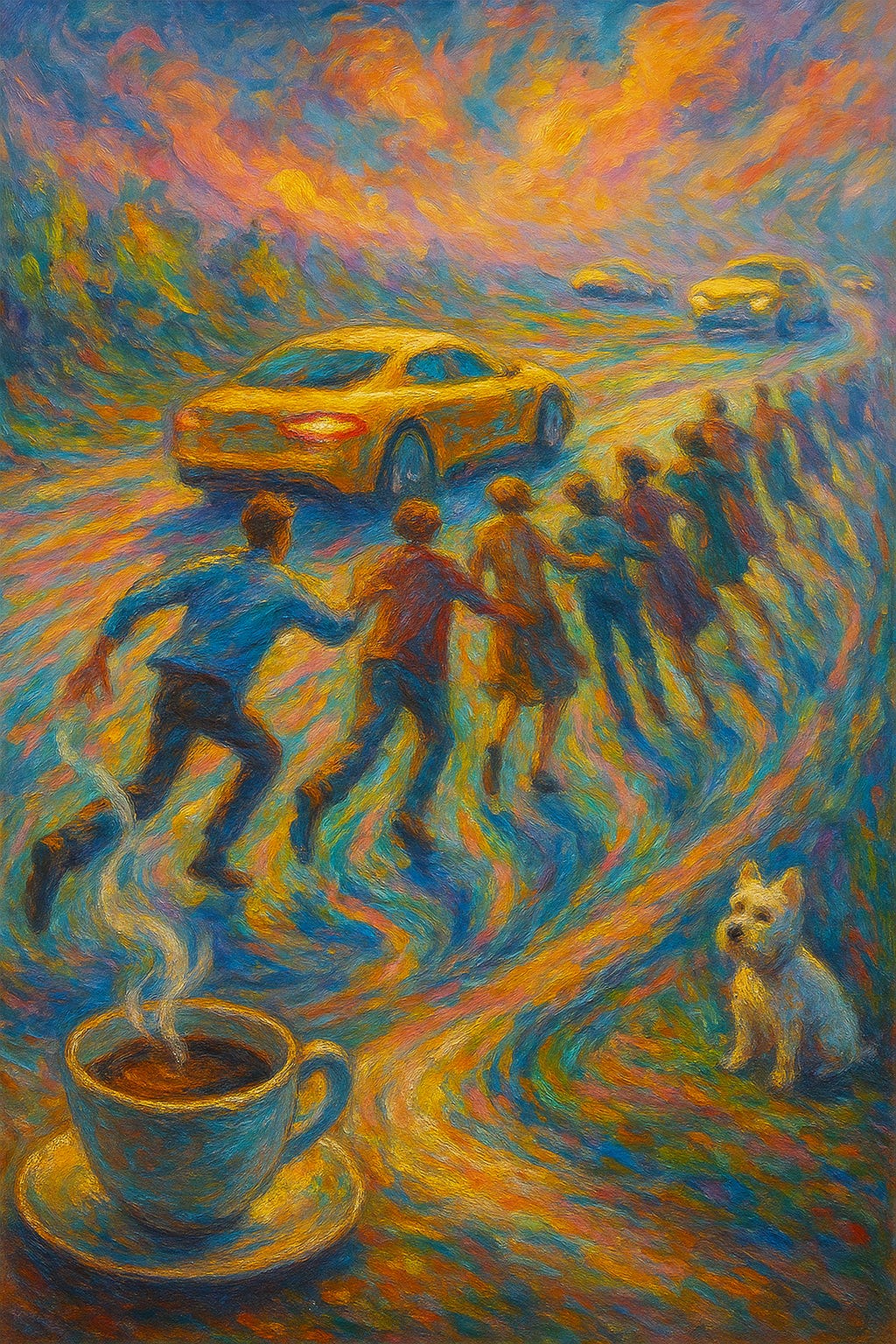
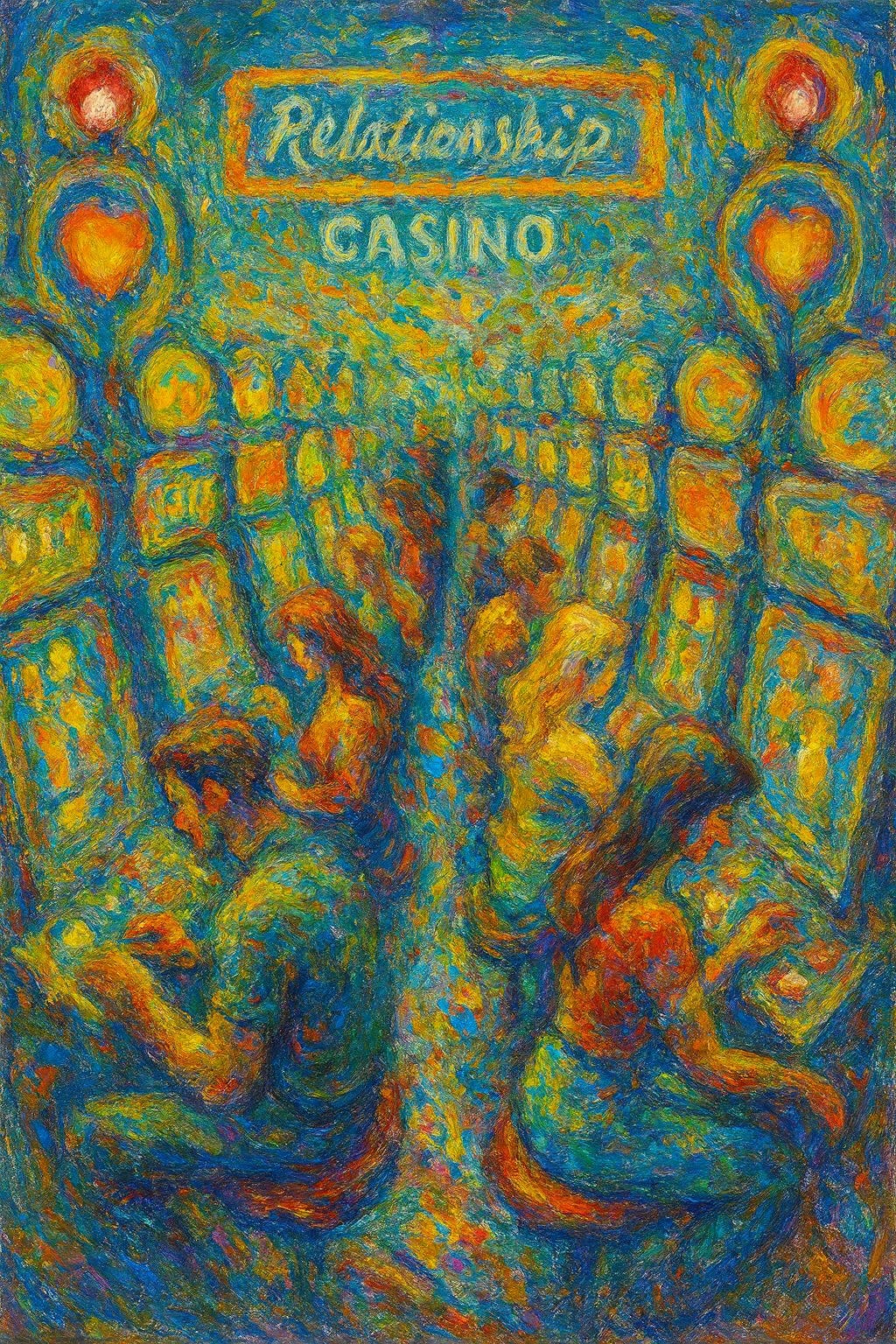
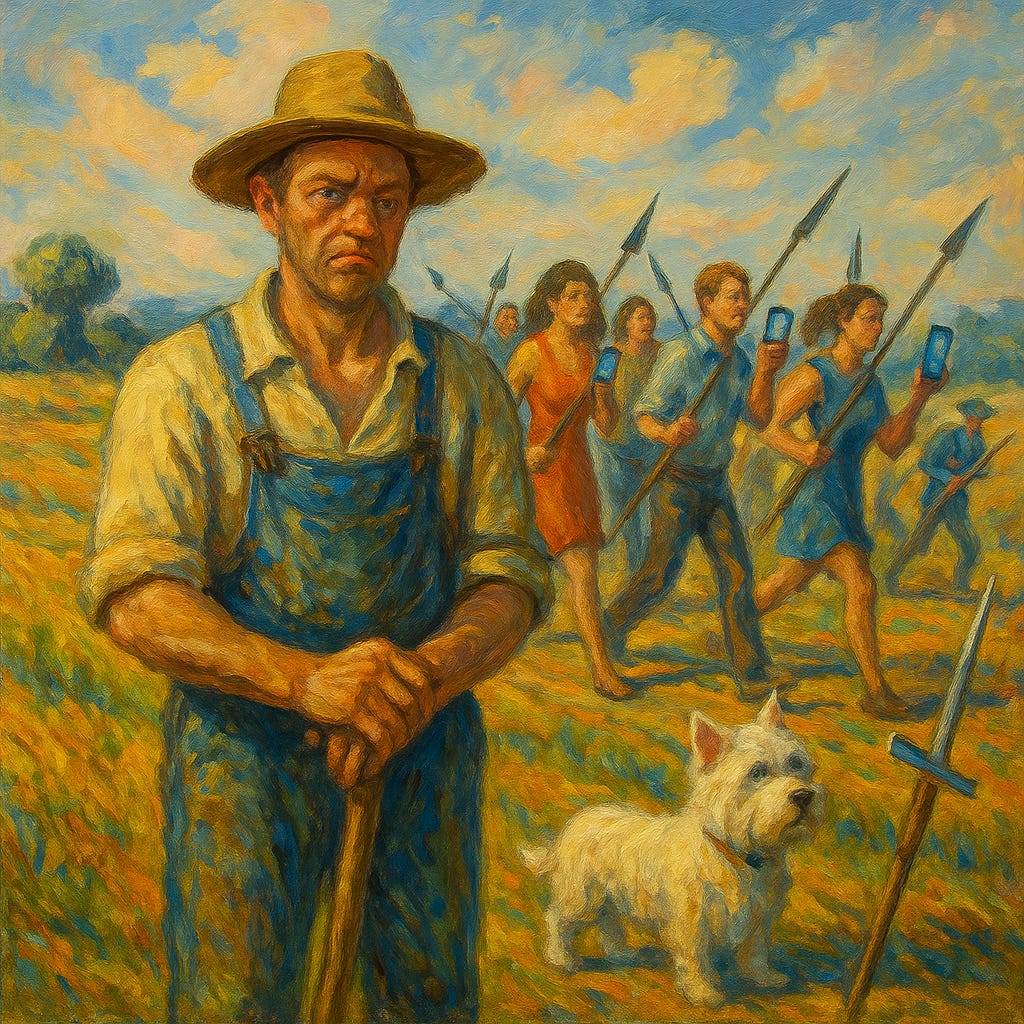
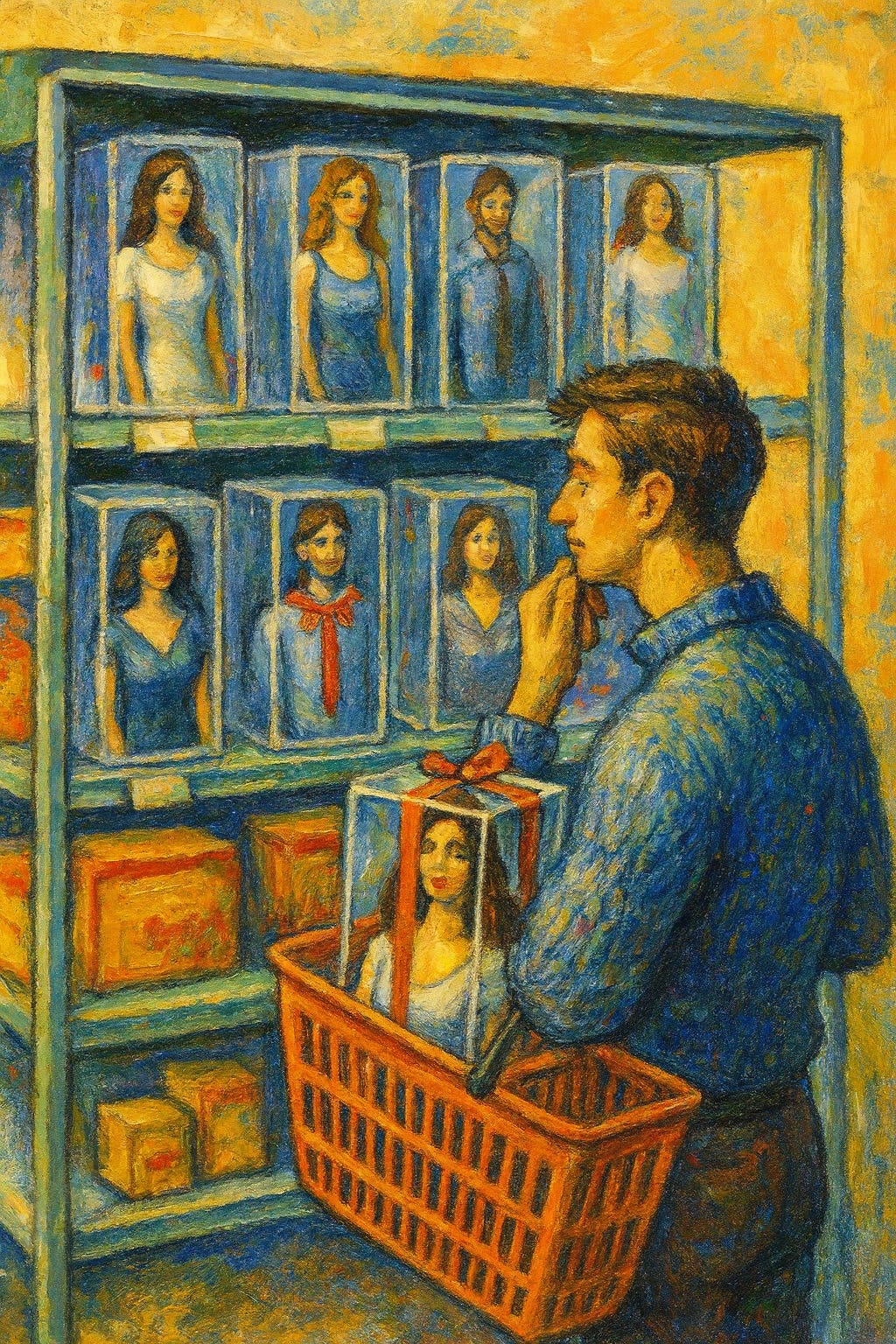
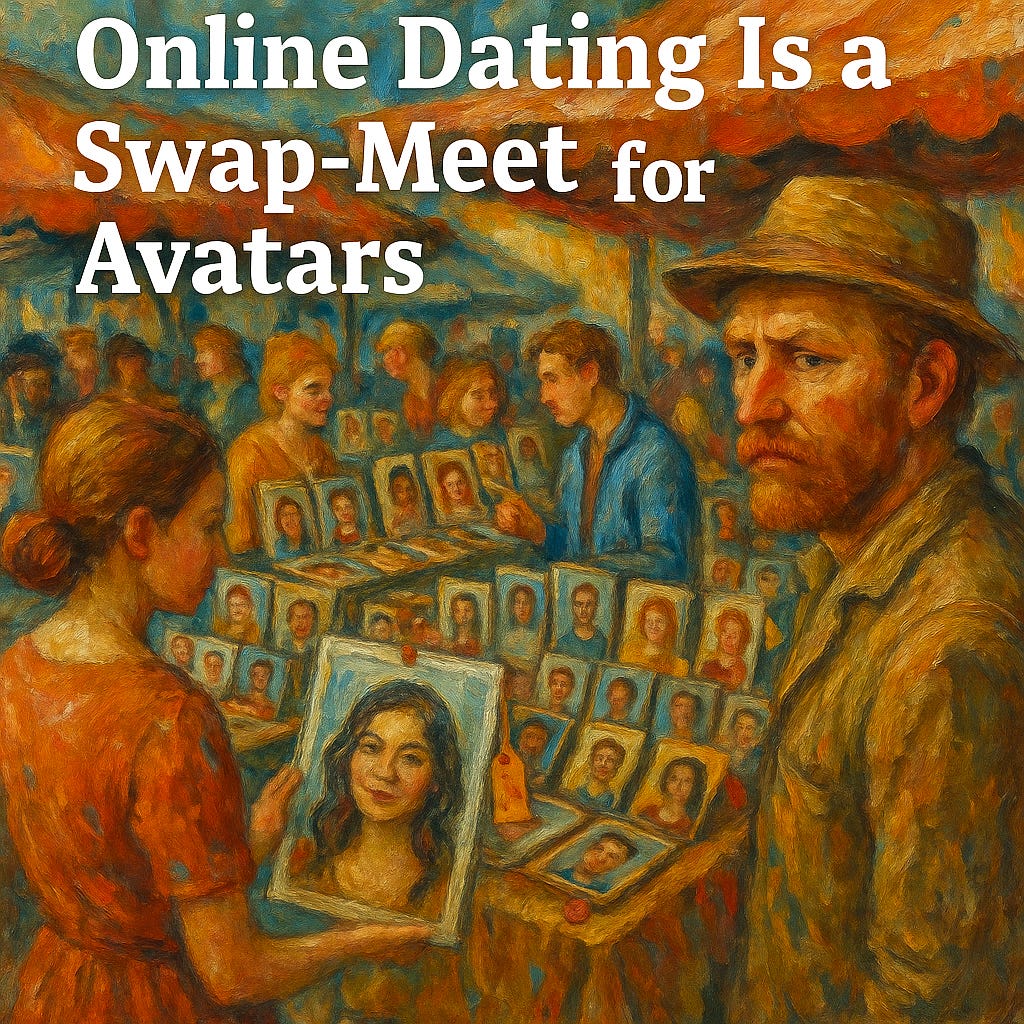


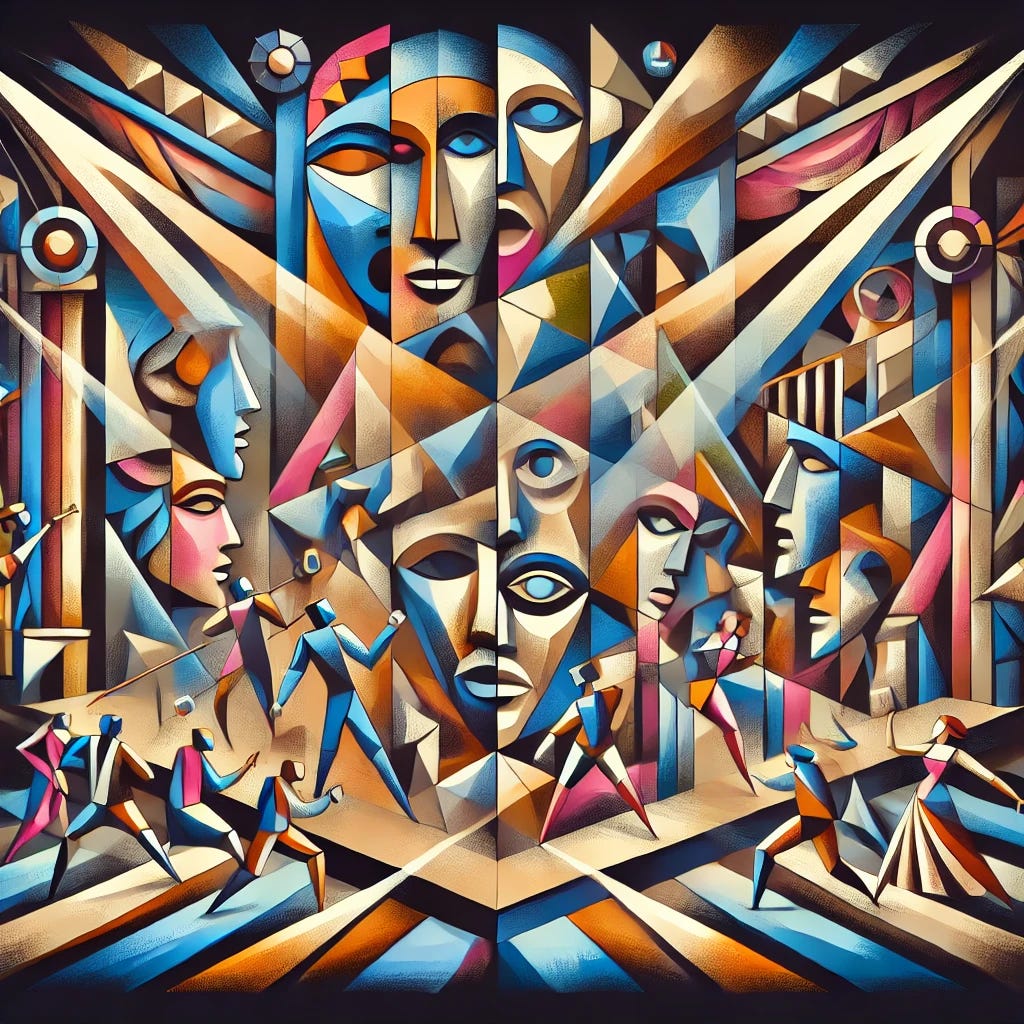
Great question: “Is our cultural destiny to be a lonely society of individuals sitting on a bench at the dog park, captivated by their phones and ‘dating apps’ that offer little more than endless pictures and bright lights?”
My wife was never jealous of my relationship with my dog. One wonders if she would be jealous of a relationship I would conceivably have with an attractive female AI robot. I think she would, especially if it was sexual, which was not the case with my dog.